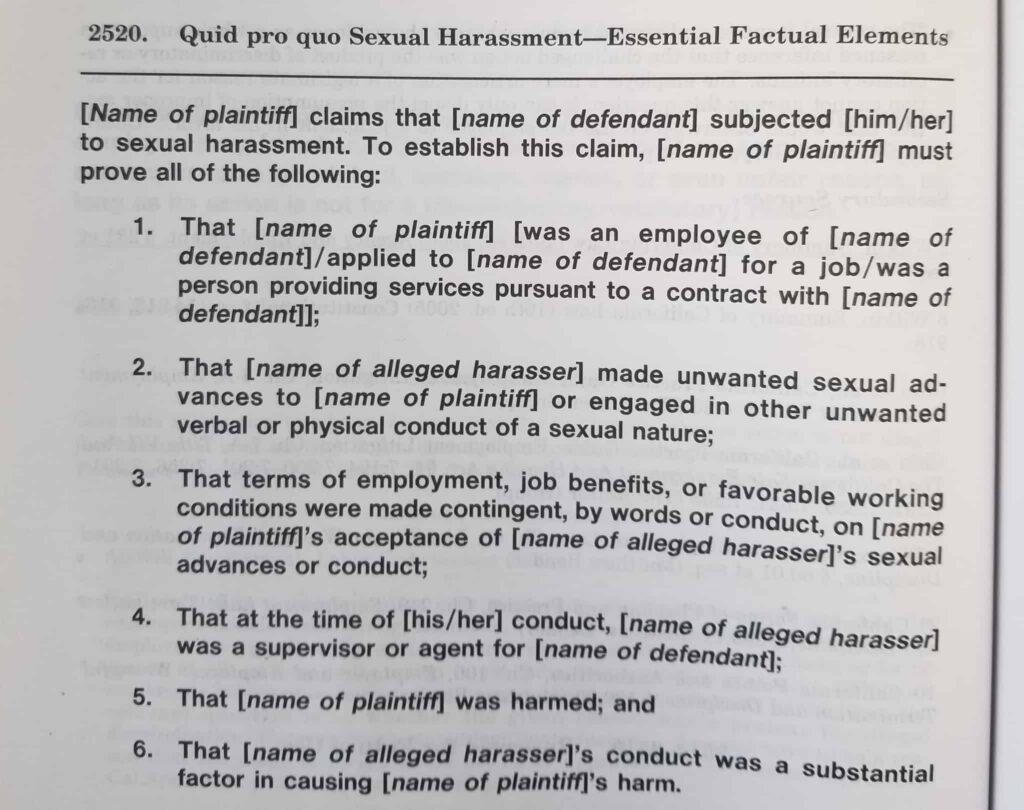In sexual harassment cases, the accuser must prove that the alleged harasser made “unwanted” sexual advances or engaged in other unwanted verbal or physical conduct of a sexual nature”. (These words come from the California jury instructions, CACI; see for example CACI Instruction 2520 Quid Pro Quo Sexual Harassment.) In the sexual harassment jury instructions, the word “unwanted” is not defined. Courts of law leave it to juries, that is the citizens who decide each case, to determine whether or not the alleged sexual harassment was “unwanted”.
Legal scholars generally consider “unwanted” to be a lesser standard than “consent”. Most people view whether harassment was wanted or unwanted as whether there was consent for the sexual act involved.
The concepts of consent and wanted or unwanted are mixed in the minds of typical jurors. In the federal law under Title VII, the operative word is “unwelcome”. Sexual harassment under Title VII is not significantly different from sexual harassment under the Fair Employment and Housing Act, but these words may or may have not a different meaning to particular jurors or sets of juries. It depends on the mindset of those who are on a particular jury.
Legislatures are struggling with ways to clarify the concept of consent in the context of sexual activity. In the “Yes-Means-Yes” law in California, the legislation is designed to encourage universities who receive government funds to adapt policies for interactions between students that support the concept that there needs to be mutual affirmative consent to deem sexual activity as consensual. Opponents have attacked this policy on the grounds that in practice, it shifts the burden of proof onto the accused student. Opponents point out the situation in which both of the participants are drunk and unable to give consent, but proceed to have a sexual encounter. Opponents complain that the accusers are absolved of responsibility to obtain consent before the act, but the accused is held responsible for not obtaining consent, even though both parties were inebriated and incapable of consent.
We are all familiar with the concept of minors not being able to give consent to sexual activity as a matter of law.
Stanford professor Rich Roberts addressed the issue of consent in his paper, “Constrained Consent: Women, Marriage and Household Instability in Colonial French West Africa (April 2013)”. Professor Roberts notes that “the concept of consent in our contemporary debates about forced marriage takes as its starting point a “robustly self-sufficient notion of responsibility” that associates freedom with the ability to separate oneself from others and assumes a conceptual separation between free choice, arranged, and forced marriages.” The pressures of family disapproval and community disapproval lean heavily on young women who are assigned marital partners.
In our very modern society here in California, it is often times difficult for a typical citizen to appreciate the pressures that women sometimes encounter in the workplace to provide sexual favors in exchange for continued employment or even advancement in the workplace. Our jury of citizens is more likely to forgive immigrants who are working in factories for submitting to quid pro quo sexual harassment, than they are for women who appear to be more privileged.
The concepts of consent, unwelcome, and unwanted are interrelated and need to be evaluated with empathy for the particular situations of victims.
If you or someone you care about has problems with sexual harassment, you can contact Timothy Broderick at the Broderick Law Firm for a free consultation.



